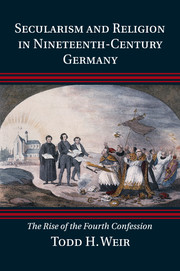Crossref Citations
This Book has been
cited by the following publications. This list is generated based on data provided by Crossref.
McLeod, Hugh
2015.
Christianity and nationalism in nineteenth-century Europe.
International journal for the Study of the Christian Church,
Vol. 15,
Issue. 1,
p.
7.
2016.
Books Received.
The Journal of Ecclesiastical History,
Vol. 67,
Issue. 2,
p.
462.
Avraham, Doron
2016.
The idea of a Jewish nation in the German discourse about emancipation.
Nations and Nationalism,
Vol. 22,
Issue. 3,
p.
505.
Horii, Mitsutoshi
2017.
Contextualizing “religion” of young Karl Marx: A preliminary analysis.
Critical Research on Religion,
Vol. 5,
Issue. 2,
p.
170.
Hunter, Ian
2017.
Secularisation: process, program, and historiography.
Intellectual History Review,
Vol. 27,
Issue. 1,
p.
7.
Williamson, George S.
2017.
TheChrist MythDebate: Radical Theology and German Public Life, 1909–1913.
Church History,
Vol. 86,
Issue. 3,
p.
728.
Johnson, David R.
Ecklund, Elaine Howard
Di, Di
and
Matthews, Kirstin R.W.
2018.
Responding to Richard: Celebrity and (mis)representation of science.
Public Understanding of Science,
Vol. 27,
Issue. 5,
p.
535.
Blankholm, Joseph
2018.
Secularism and Secular People.
Public Culture,
Vol. 30,
Issue. 2,
p.
245.
Hagemann, Karen
and
Lässig, Simone
2018.
Discussion Forum: The Vanishing Nineteenth Century in European History?.
Central European History,
Vol. 51,
Issue. 4,
p.
611.
2018.
Luther, Conflict, and Christendom.
p.
300.
Hunter, Ian
2018.
Public Law and the Limits of Philosophy: German Idealism and the Religious Constitution.
Critical Inquiry,
Vol. 44,
Issue. 3,
p.
528.
Hacohen, Malachi Haim
2019.
Jacob & Esau.
Avraham, Doron
2019.
German Neo-Pietism and the Formation of National Identity.
Church History,
Vol. 88,
Issue. 1,
p.
87.
Levi D’Ancona Modena, Luisa
2020.
Jews, Liberalism, Antisemitism.
p.
153.
Jackson Ravenscroft, Ruth
2020.
Theology and politics in the German imagination, 1789–1848.
Global Intellectual History,
Vol. 5,
Issue. 1,
p.
1.
Leber, Christoffer
2020.
Translation in Knowledge, Knowledge in Translation.
Vol. 154,
Issue. ,
p.
209.
Feiner, Shmuel
2020.
A European Enlightenment in the Promised Land? The JewishKulturkampfat the Turn of the Twentieth Century.
The European Legacy,
Vol. 25,
Issue. 7-8,
p.
790.
SEHAT, DAVID
2020.
POLITICAL ATHEISM: THE SECULARIZATION AND LIBERALIZATION OF AMERICAN PUBLIC LIFE.
Modern Intellectual History,
Vol. 17,
Issue. 1,
p.
249.
Loue, Sana
2020.
Case Studies in Society, Religion, and Bioethics.
p.
189.
Jansson, Anton
2020.
Building or destroying community: the concept of
Sittlichkeit
in the political thought of
Vormärz
Germany
.
Global Intellectual History,
Vol. 5,
Issue. 1,
p.
86.





